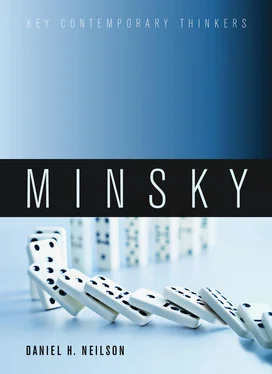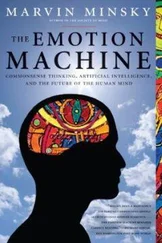* * *
To know Minsky’s economics, we must also know Minsky as economist. Viewed in its entirety, Minsky’s published work follows the contexts, events, and debates of his time; he draws on texts, conversations, and experience and incorporates each into a worldview, a theory that is constantly refined, updated to add what is new and subtract what is no longer true or no longer needed. In each of Minsky’s publications we can see not only knowledge but also a way of knowing. In learning from Minsky we must study both: not only what he knew but how he knew it. For the events and debates of our time are not those of Minsky’s time; his ideas cannot be taken up unaltered. They must be interpreted, given meaning in our own context. Minsky’s way of knowing will lead us to our own. Thinking back to his days as a student, the septuagenarian Minsky wrote:
[T]here is never a true reading of a text. The reader is not a mere passive recipient, but an active creator of interpretation. The reader brings priors to the text, priors that can be more or less restricting or binding. In economics, there is another difficulty: history unfolds and institutions evolve. As the world moves through time, each reader has to interpret (extract meaning from) events and institutional changes and integrate the reading of what happened and what is into an interpretation, into a maintained theory. This means that, to a serious scholar, the lessons learned from a text are subject to change. (1992b, 365)
Minsky’s scholarship began with the completion of his doctoral dissertation at Harvard in 1954. His subject was business cycles, a problem of unquestionable importance, in light of the experience of 1929 and the Great Depression that had been the economic context for his formative studies. It seemed also to be a promising line of research: economic theory did not yet offer satisfying answers. Minsky found a disconnected body of thought, with each author emphasizing a particular phenomenon, attached to a different policy approach; what was lacking was an integrated work that transcended these compartments. The Great Depression had demonstrated that a severe crisis was a phenomenon that cut across the fields of economic experience, that needed to be understood from a synthetic point of view. For a PhD student, such an approach would be ambitious, but Minsky had learned to put vision before technique (1992b; Mehrling 1999). If the result would be received as “eclectic,” so much the better: the problem had enough texture to warrant it. He begins:
Paraphrasing Voltaire, we can assert that if business cycles did not exist, the economic theorist would have invented them. For if we look at the problem of business cycles, without any doctrinaire bias, it seems obvious that in this branch of economics a natural connection occurs between the often too separate compartments of economic analysis: between the “monetary” and the so-called real phenomena. Therefore, a theory of business cycles, to be consistent with the observable material and the inherited doctrines, should be a blend of the analytical material which deals with the interrelations among a few broad aggregates – which traditionally has been the approach of monetary theory – and the analytical material which deals with the behavior of individual economic units and of particular markets – which has been the sphere of price and distribution theory. This thesis can be interpreted as an attempt to construct such an eclectic business cycle theory. ([1954] 2000, 1)
Minsky had lost his dissertation supervisor, the great Joseph Schumpeter, with his death in 1950. Though Minsky completed his project under the supervision of Wassily Leontief, he remained Schumpeter’s student, and the dissertation was the beginning of an effort to build on his professor’s work. Schumpeter had placed finance at the center of his understanding of economic change. Credit extended in support of business activity is the mechanism by which entrepreneurs are given control over the means of production, even before those efforts bear fruit:
By credit, entrepreneurs are given access to the social stream of goods before they have acquired a normal claim to it. It temporarily substitutes, as it were, a fiction of this claim for the claim itself. Granting credit in this sense operates as an order upon the economic system to accommodate itself to the purposes of the entrepreneur, as an order on the goods which he needs: it means entrusting him with productive forces. (Schumpeter 1934, 107)
The financial system is not just a way of allocating command of production. As the very organizing principle of capitalism, finance is itself the most important of the evolving institutions to which economists must attend; in the financial record is written the unfolding history of the entrepreneurial successes and failures of capitalism: “Schumpeter brought to the analysis of a monetary production economy the sense of the economy as an evolving institutional structure. Nowhere is market-driven institutional evolution (innovation) more apparent than in the financial sphere” (1993c, 113). But Schumpeter’s work on business cycles did not, Minsky thought, fully incorporate the lessons of the Depression. The contradiction was surprising, to a mature Minsky looking back, for Schumpeter had many of the necessary ingredients at his disposal:
[Schumpeter] noted that “The money market is always, as it were, the headquarters of the capitalist system” (Schumpeter, 1934: 126). This seemingly implies that the sequence of events that can be said to have been triggered by the break in stock market prices in October 1929 – that led to the complete closure of the banking system in March of 1933 – was not peripheral but rather were central to the functioning of a capitalist economy. … Schumpeter may write of financial catastrophe, but he nowhere explains catastrophe. The significance of liability structures and the importance to banks as holders of business liabilities of business profits are only peripheral concerns in Schumpeter’s analysis in The Theory of Economic Development and Business Cycles . (1986c, 114)
Minsky already had a sense of his vision, his maintained theory; here was a set of historical circumstances in need of interpretation: to explain catastrophe. If the money market, the banking system, is the center of capitalism, why should the financial structures that unraveled in the Depression be relegated to the margins of analysis? It would become the effort that was to form the intellectual basis of his career. “To Schumpeter’s original view of the monetary process we have to add a specific consideration of the liquidity phenomenon” ([1954] 2000, 225). To interpret catastrophe would require that liability structures, and the sudden intervention of crisis in the normal functioning of capitalism, be placed at the center.
* * *
Minsky’s training – Chicago BS in mathematics (1941), Harvard PhD in economics (1954) – started him off with the makings of a disciplinary insider. After teaching at Brown while still a graduate student, he accepted a faculty position at Berkeley in 1958. His education and early publications in academic journals of high prestige among economists (1957a; 1957b; 1959a; 1961) might have set him on the path to prominence. But he left Berkeley for Washington University in St Louis, and his subsequent publications are in more marginal academic journals and in the non-academic press. Minsky never withdrew his claim on economics, however; instead he resolutely and repeatedly sited himself at its margins.
This must be in part because Minsky’s treatment of themes central to his work is in conflict with those of the discipline. The issues of time and uncertainty created serious problems for economists, he thought, and the mechanisms of finance suggested a way to study them. “Economics is a strange discipline in which present, past, and future coexist in time. A cash-flow approach to economic theory helps unravel some of the problems associated with time” (1982d, 19; also 1993b). Minsky’s objection echoes that of G. L. S. Shackle: “To look down the complete vista of all relevant history-to-come is to see a still picture where nothing happens. In such a world … there would be no need for postponement of choice, no need for liquidity” (Shackle 1972, 165). For Shackle as for Minsky, economics offers no adequate understanding of time, and therefore no adequate understanding of instability.
Читать дальше












